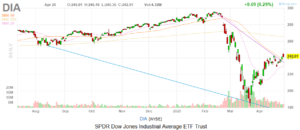The major equity averages didn’t do much of anything Tuesday even as several big names reported earnings before the opening bell. Fortunately, there was some decent commentary from those companies, albeit cautious, indicating that the U.S. economy could start rebounding in the second half of the year.
Source: Provided by Finviz
- The S&P 500 slipped 0.52%.
- The Dow Jones Industrial Average declined 0.14%
- The Nasdaq Composite fell 1.40%
- On light news, American Express (NYSE:AXP) was the Dow’s top performer on Tuesday, gaining 3.97%.
Several Dow components reported first-quarter results before the opening bell today and while the numbers weren’t pretty — no surprise there — the takeaway appears to be that some well-known companies are willing to bet a recovery will materialize in the second half.
Obviously, Alphabet (NASDAQ:GOOGL, NASDAQ:GOOG) isn’t a Dow stock, but that company reports first-quarter numbers after the close today and the second-half recovery thesis could be tested by the firm’s commentary on the issue. As the dominant name in online advertising, among other arenas, what Alphabet has to say about its second-half outlook could be telling for near-term market direction.
Big moves were hard to come by today, but 17 of 30 stocks were higher in late trading.
Decent Earnings Move
On Monday, 3M (NYSE:MMM) rallied ahead of its Tuesday earnings report and while there was some follow through today, the pop in the industrial conglomerate today was more about words from CEO Mike Roman than the company’s first-quarter results.
Roman said he expects the current quarter will be the worst of this year for the U.S. economy, adding that the company is already seeing signs of a “broad-based recovery” in China, the world’s second-largest economy.
Pharma Disappointment
Healthcare, the second-largest sector in the S&P 500, is a steady performer this year due in part to the novel coronavirus outbreak, but there were some disappointing post-earnings reaction today for Dow components Pfizer (NYSE:PFE) and Merck (NYSE:MRK).
Merck slipped despite reporting adjusted earnings per share of $1.50 on revenue of $12.06 billion. Wall Street was expecting earnings of $1.34 per share and revenue of $11.46 billion. However, Merck’s main problem wasn’t Q1 numbers. It was the company’s guidance for the rest of the year.
The Dow component forecast earnings of $5.17 to $5.37 on revenue of $46.1 billion to $48.1 billion when analysts were expecting EPS of $5.56 on revenue of $48.72 billion for the year.
Pfizer performed less poorly today after reporting earnings, with the company saying it could have a coronavirus vaccine ready for emergency use by the fall while noting it could make “hundreds of millions of doses” of the therapy in 2021.
Not All Bad
Caterpillar (NYSE:CAT), one of the Dow’s most cyclical, economically sensitive names, traded slightly higher today following what was a dismal earnings report. The company earned $1.60 a share, down from $2.94 a year earlier and below the $1.69 analysts expected. Caterpillar’s slack results are directly attributable to Covid-19.
“The ultimate impact of the pandemic on our 2020 results remains uncertain, and will be based on the duration of the virus and the magnitude of the economic impact on global demand for our product,” said CEO Jim Umpleby.
Finally, Positive Dividend News
This year has been hard on dividend investors, but as was noted here last week, some Dow components will bring good cheer on that front. International Business Machines (NYSE:IBM) did just that today, bumping its dividend up by a penny to $1.63 a share.
A penny-a-share dividend increase usually isn’t noteworthy, but in this case, it marks 25 straight years in which IBM increased the payout, meaning the company is now eligible for inclusion in the S&P 500 Dividend Aristocrats Index.
Bottom Line on the Dow Jones Today
For investors looking for a factor that could be a winner, BlackRock suggests a possible surprise in the form of momentum stocks.
“While momentum typically struggles with volatility, it benefits from the policy reaction to volatility: more liquidity,” according to the asset manager. “As central banks have put their balance sheets at the disposal of fiscal spending, we have witnessed a surge in central bank asset holdings that has dwarfed the post-GFC response.”
Todd Shriber has been an InvestorPlace contributor since 2014. As of this writing, he did not hold a position in any of the aforementioned securities.
